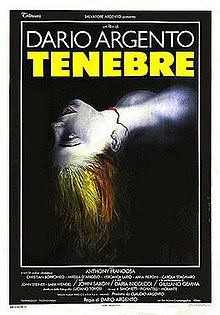Tenebre (film)
| Tenebrae | |
|---|---|

Italian theatrical release poster by Renato Casaro
|
|
| Directed by | Dario Argento |
| Produced by |
Claudio Argento Salvatore Argento |
| Written by | Dario Argento |
| Starring |
Anthony Franciosa John Saxon Daria Nicolodi |
| Music by |
Claudio Simonetti Fabio Pignatelli Massimo Morante |
| Cinematography | Luciano Tovoli |
| Edited by | Franco Fraticelli |
|
Production
company |
Sigma Cinematografica Roma
|
|
Release date
|
28 October 1982 |
|
Running time
|
110 minutes |
| Country | Italy |
| Language | English Italian |
| Budget | Unknown |
| Box office | Unknown |
| Actor | Role | |
|---|---|---|
| Franciosa, AnthonyAnthony Franciosa | Neal, PeterPeter Neal | |
| Saxon, JohnJohn Saxon | Bullmer, Bullmer | |
| Nicolodi, DariaDaria Nicolodi | Anne, Anne | |
| Gemma, GiulianoGiuliano Gemma | Giermani, DetectiveDetective Giermani | |
| D'Angelo, MirellaMirella D'Angelo | Tilde, Tilde | |
| Steiner, JohnJohn Steiner | Berti, ChristianoChristiano Berti | |
| Lario, VeronicaVeronica Lario | McKerrow, JaneJane McKerrow | |
| Borromeo, ChristianChristian Borromeo | Gianni, Gianni | |
| Wendel, LaraLara Wendel | Alboretto, MariaMaria Alboretto | |
| Pieroni, AniaAnia Pieroni | Manni, ElsaElsa Manni | |
| Banti, MirellaMirella Banti | Marion, Marion | |
| Stagnaro, CarolaCarola Stagnaro | Altieri, DetectiveDetective Altieri | |
| Robin's, EvaEva Robin's | Girl on Beach, Girl on Beach |
Tenebrae (also known as Tenebre) is a 1982 English-language Italian giallo film written and directed by Dario Argento. The film stars Anthony Franciosa as American author Peter Neal, who – while in Rome promoting his latest murder-mystery novel – becomes embroiled in the search for a serial killer who may have been inspired to kill by the novel. John Saxon and Daria Nicolodi co-star as Neal's agent and assistant; Giuliano Gemma and Carola Stagnaro appear as detectives investigating the murders. John Steiner, Veronica Lario and Mirella D'Angelo also feature. The film has been described as exploring themes of dualism and sexual aberration, and has strong metafictional elements; some commentators consider Tenebrae to be a direct reaction by Argento to criticism of his previous work, most especially his depictions of murders of beautiful women.
After Argento had experimented with pure supernatural horror with 1977's Suspiria and 1980's Inferno, Tenebrae represented the filmmaker's return to the giallo horror subgenre, which he had helped popularize in the 1970s. Argento was inspired by a series of incidents which saw an obsessed fan telephone the director to criticise him for the damaging psychological effects of his previous work. The telephone calls culminated in death threats towards Argento, who channelled the experience into the writing of Tenebrae. The director also wanted to explore the senselessness of killings he had witnessed and heard about while staying in Los Angeles in 1980, and his feeling at the time that true horror came from those who wanted "to kill for nothing".
Shot on location in Rome and at , Tenebrae utilised mostly modern-looking locations and sets to help Argento realise his intent that the film reflect a near-future with a diminished population; the director filmed none of the historical landmarks that usually featured in films set in Rome. Employing director of photography Luciano Tovoli, Argento also intended that the film simulate the stark, realistic lighting featured in television police shows at the time; production designer Giuseppe Bassa created supporting environments that were cold and austere, with sharp angles and modernistic spaces. Several former members of Italian rock band Goblin provided Tenebrae's music, a synth-heavy score inspired by rock and disco music.
...
Wikipedia
